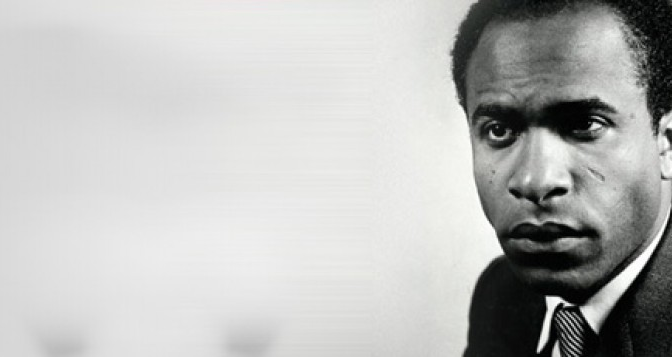“As long as the black man is among his own, he will have no occasion, except in minor internal conflicts, to experience his being through others,” Frantz Fanon writes in “The Fact of Blackness.”
In the 1952 essay, he argues the ontology put forward by Jean-Paul Sartre and GWF Hegel is flawed, insofar as white people can, with their gaze, constitute people of color as objects. People of color, by contrast, cannot do the same to white people. This complicates an ontological neutrality wherein people of color are unfree and objectified, “fixed” in the eye of the “white-other.” Fanon goes on to argue, that those with dark skin have to confront the manufactured histories about their cultures and origins placed upon them in colonialist society.
Fanon was an existentialist humanist, critical theorist, and psychiatrist. His critiques of colonialism were banned by the French government. The author of plays, essays, and political analyses also kept company with popular figures like Jean-Paul Sartre, Maurice Merleau-Ponty, and Aimé Césaire.
Below are powerful and relevant passages from “The Fact of Blackness” and a link to where you can read the essay in its entirety.
Facts of Blackness by Frantz Fanon
“Sealed into that crushing objecthood, I turned beseechingly to others. Their attention was a liberation, running over my body suddenly abraded into nonbeing, endowing me once more with an agility that I had thought lost, and by taking me out of the world, restoring me to it. But just as I reached the other side, I stumbled, and the movements, the attitudes, the glances of the other fixed me there, in the sense in which a chemical solution is fixed by a dye. I was indignant; I demanded an explanation. Nothing happened. I burst apart. Now the fragment have been put together again by another self.
As long as the black man is among his own, he will have no occasion, except in minor internal conflicts, to experience his being through others. There is of course the moment of “being for others,” of which Hegel speaks, but every ontology is made unattainable in a colonized and civilized society. It would seem that this fact has not been given sufficient attention by those who have discussed the question. In the Weltanschauung of a colonized people there is an impurity, a flaw that outlaws any ontological explanation. Someone may object that this is the case with every individual, but such an objection merely conceals a basic problem.
Ontology—once it is finally admitted as leaving existence by the wayside—does not permit us to understand the being of the black man. For not only must the black man be black; he must be black in relation to the white man. Some critic will take it on themselves to remind us that this proposition has a converse. I say that this is false. The black man has no ontological resistance in the eyes of the white man. Overnight the Negro has been given two frames of reference within which he has had to place himself. His metaphysics, or, less pretentiously, his customs and the sources on which they were based, were wiped out because they were in conflict with a civilization that he did not know and that imposed itself on him.”
He goes on to discover himself in the eye of the other,
“I was responsible at the same time for my body, for my race, for my ancestors. I subjected myself to an objective examination, I discovered my blackness, my ethnic characteristics; and I was battered down by tom-toms, cannibalism, intellectual deficiency, fetishism, racial defects, slave-ships, and above all else, above all: ‘Sho good eatin.’”
“I sit down at the fire and I become aware of my uniform. I had not seen it. It is indeed ugly. I stop there, for who can tell me what beauty is”
He then refers to Sartre’s work in “Anti-Semite and Jew,”
“At first thought it may seem strange that the anti-Semite’s outlook should be related to that of the Negro-phobe. It was my philosophy professor, a native of the Antilles, who recalled the fact to me one day: “Whenever you hear anyone abuse the Jews, pay attention, because he is talking about you.” And I found that he was universally right—by which I meant that I was answerable in my body in my heart for what was done to my brother. Later I realized that he meant, quite simply, an anti-Semite is inevitably anti-Negro.”
Fanon concludes, but the work is on going:
“I feel in myself a soul as immense as the world, truly a soul as deep as the deepest of rivers, my chest has the power to expand without limit. I am a master and I am advised to adopt the humility of the cripple. Yesterday, awakening to the world, I saw the sky turn upon itself utterly and wholly. I wanted to rise, but the disemboweled silence fell back upon me, its wings paralyzed. Without responsibility, straddling Nothingness and Infinity, I began to weep.”

